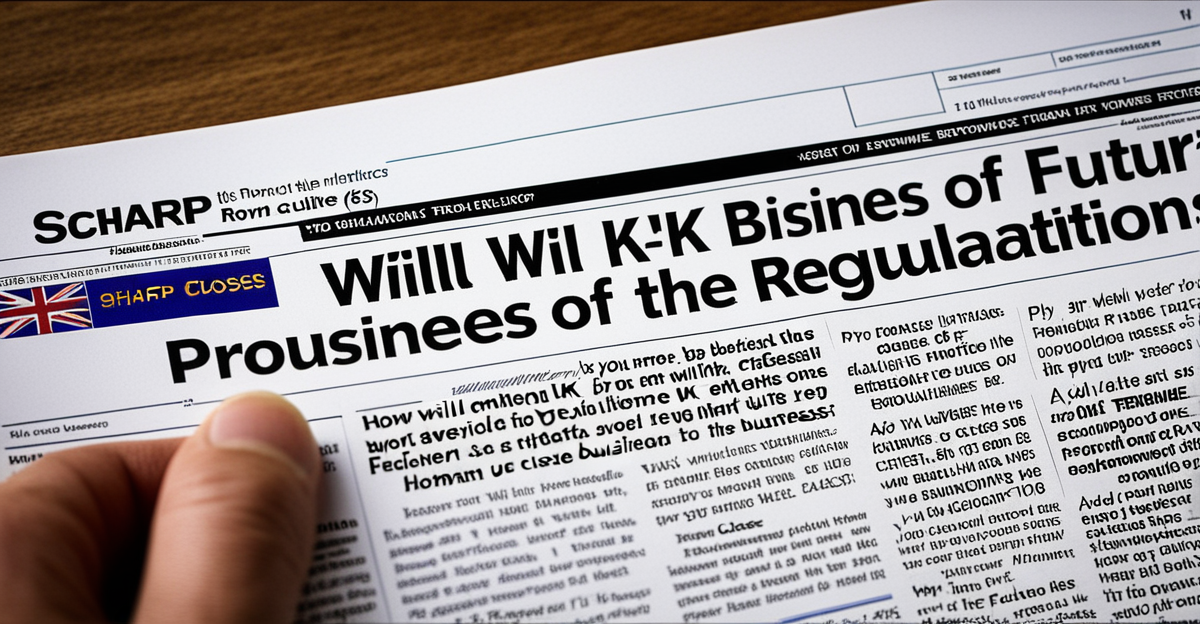Immediate changes in UK business regulations following Brexit
Since Brexit, UK business regulations after Brexit have undergone immediate and significant transformations. One of the most notable immediate post-Brexit changes is the shift from EU-wide regulatory frameworks to independent UK rules. This transition marked a clear regulatory divergence that affects various compliance areas, including customs procedures, product standards, and employment law.
Previously aligned with EU directives, UK regulations now emphasize domestic priorities and sovereignty. For example, product certification schemes previously recognized EU-wide now require separate UK approval or markings, imposing new documentation and administrative steps on businesses.
This might interest you : What are the essential skills for success in the UK business sector?
Early impacts on UK businesses include adapting to these altered compliance procedures. Companies must reassess supply chains, legal obligations, and reporting protocols to meet the updated standards. A nuanced understanding of these UK business regulations after Brexit is essential for ensuring uninterrupted trade and avoiding penalties.
This regulatory shift presents challenges but also opportunities for businesses to innovate and align more closely with UK-specific market conditions while managing the complexities of divergence from the EU framework that had long governed their operations.
Also read : What strategies can UK businesses use to thrive in a post-pandemic world?
Immediate changes in UK business regulations following Brexit
Since Brexit, UK business regulations after Brexit have undergone swift and significant transformations. One prominent immediate post-Brexit change was the UK’s decision to exit the EU’s single market and customs union, resulting in the reintroduction of customs checks and new import-export documentation. This adjustment forced businesses to revise their compliance procedures quickly to avoid delays and penalties.
Regulatory divergence became apparent through the UK setting distinct standards in areas such as product safety and environmental regulations. Unlike the uniform EU regulations, the UK now has the freedom to amend rules faster but must communicate clearly with businesses navigating these differences. For example, UK product labelling requirements have started diverging to reflect local priorities, creating fresh compliance hurdles for companies trading with both the UK and EU.
Early impacts on UK businesses include increased administrative burdens due to more complex customs processes and the need to understand evolving UK-specific regulations. Compliance costs rose for firms, especially exporters, who must now handle separate certifications and navigate overlapping regulatory regimes. Adapting to these immediate post-Brexit changes requires staying informed and agile, as ongoing adjustments continue to develop the newly independent UK regulatory landscape.
Immediate changes in UK business regulations following Brexit
Since Brexit, UK business regulations after Brexit have rapidly transformed, reflecting significant immediate post-Brexit changes. The most striking element is the pronounced regulatory divergence from the EU, which redefines compliance frameworks across industries.
One core change was the withdrawal from EU-wide regulatory oversight, compelling many businesses to familiarize themselves with UK-specific rules. For instance, product standards no longer align automatically with EU rules. This shift requires firms to secure distinct certifications under new UK regimes, introducing additional administrative burdens.
Customs and border procedures have also evolved, with UK businesses adapting to separate import-export documentation and customs declarations previously unified under the EU single market. Consequently, businesses report increased complexity in logistics and supply chain management—early indicators of operational strain triggered by these immediate post-Brexit changes.
Employment law adjustments further illustrate regulatory divergence. UK labor protections have begun to deviate, affecting contracts and workplace policies, necessitating vigilant compliance monitoring.
This landscape demands not only adaptation but also proactive regulatory understanding. Firms that swiftly realign their processes with evolving UK business regulations after Brexit stand better positioned to maintain market access and minimize disruption as these immediate changes continue to solidify.
Immediate changes in UK business regulations following Brexit
Since Brexit, UK business regulations after Brexit have rapidly shifted away from EU frameworks, marking clear regulatory divergence. One of the most immediate post-Brexit changes was the establishment of distinct customs procedures, requiring businesses to manage new import-export documentation, declarations, and tariffs. This replaced the seamless trade previously enabled by the EU single market.
Key differences from the prior EU-aligned system include the UK’s ability to modify product standards independently. For example, areas like chemical safety and product labelling now operate under UK-specific rules, diverging from EU standards. Consequently, certifications that were once universally accepted must now be separately obtained or recognised within the UK.
Early impacts on UK businesses have been substantial. Many face increased administrative burdens and compliance costs as they adapt to these immediate post-Brexit changes. Companies must stay vigilant about evolving regulations to avoid penalties and supply chain interruptions. The shift demands enhanced internal processes to ensure compliance with both UK and, where applicable, continuing EU rules, highlighting the critical nature of understanding UK business regulations after Brexit for operational resilience.
Comparison of post-Brexit UK and EU business regulations
The regulatory divergence between the UK and EU since Brexit has created clear differences across multiple business areas. One of the most significant changes is in product standards. While the EU maintains harmonised certifications for safety and quality, the UK introduced its own standards, requiring manufacturers and exporters to comply with dual regimes if trading across both markets.
Customs procedures underscore this divergence, as the UK no longer participates in the EU’s single market. This means separate customs declarations, tariffs, and origin rules, increasing administrative complexity and costs for businesses engaged in cross-border trade. The UK’s departure from the EU customs union signifies a fundamental shift in how goods move, affecting logistics and supply chains.
Another area of differentiation lies in environmental and labor regulations. The UK now has discretion to amend or relax rules faster than the EU, which may benefit some sectors but risks creating misalignment that complicates compliance for multinational firms.
In practice, businesses face heightened compliance burdens due to this regulatory divergence. Companies must stay informed on evolving UK-specific legislation while managing ongoing EU obligations, often requiring enhanced legal expertise and administrative resources to maintain market access and avoid penalties.
Immediate changes in UK business regulations following Brexit
Since Brexit, UK business regulations after Brexit have experienced substantial reform, reflecting clear regulatory divergence from previous EU governance. One prominent shift involves the redefinition of product standards. Previously harmonised under EU frameworks, UK-specific standards now require distinct certifications and approvals. For example, product labelling and safety compliance must conform to UK rules rather than EU norms, significantly altering compliance procedures for manufacturers and exporters.
The imposition of new customs regimes presents another critical immediate post-Brexit change. Businesses face additional documentation requirements for imports and exports, including customs declarations and checks not required under the EU single market. This increases administrative workload and can disrupt supply chains if not managed proactively.
Early impacts on UK companies include the need for enhanced compliance monitoring and updated internal processes. Many have allocated resources toward understanding the evolving UK business regulations after Brexit to avoid penalties. Failure to keep pace with these changes risks operational delays or trade restrictions. In sum, the immediate regulatory changes require agility and informed management to navigate successfully the challenges posed by the post-Brexit business environment.
Immediate changes in UK business regulations following Brexit
Since Brexit, UK business regulations after Brexit have undergone significant transformation marked by clear regulatory divergence from previous EU frameworks. One immediate post-Brexit change is the removal of automatic recognition of EU product standards. Businesses now face the obligation to secure separate UK certifications, reflecting the UK’s autonomy in setting its rules independent of the EU. This shift compels companies trading cross-border to comply with dual certifications, increasing administrative workload.
Customs procedures have also changed dramatically. With the UK’s exit from the EU single market, new import-export documentation and customs declarations became mandatory, replacing seamless intra-EU trade practices. The introduction of tariffs and origin rules adds complexity, requiring enhanced compliance expertise.
Early impacts on UK businesses include increased compliance costs and operational delays due to unfamiliarity with evolving UK-specific regulations. Firms must quickly adapt internal processes to manage new reporting obligations and customs paperwork. This regulatory divergence creates challenges but also opportunities as businesses recalibrate strategies to align with the transformed UK market landscape.
Understanding these immediate post-Brexit changes is essential for maintaining compliance and minimizing disruption in a constantly shifting regulatory environment.
Immediate changes in UK business regulations following Brexit
Since Brexit, UK business regulations after Brexit have seen swift immediate post-Brexit changes that reflect pronounced regulatory divergence from previous EU frameworks. Unlike the prior harmonised system, the UK now sets distinct product standards, requiring businesses to acquire separate certifications for goods destined for the UK market. This shift breaks from the EU’s uniform rules, compelling companies to handle dual compliance when trading internationally.
Customs processes also represent a major adjustment. The reintroduction of customs declarations and border checks disrupts previously seamless trade within the EU single market. Businesses must navigate new documentation and tariffs, intensifying administrative complexity and operational costs.
Early business impacts include the need to overhaul internal compliance procedures and invest resources in understanding evolving, UK-specific regulations. Failure to adapt promptly can lead to delays, penalties, or supply chain disruptions. Consequently, firms are increasingly prioritising regulatory expertise and compliance agility to manage these ongoing immediate post-Brexit changes.
Overall, these changes reveal how Brexit has transformed the regulatory environment, demanding proactive management and meticulous compliance with the new UK business regulations after Brexit landscape to sustain competitiveness.
Immediate changes in UK business regulations following Brexit
Since Brexit, UK business regulations after Brexit have experienced rapid and comprehensive transformation marked by pronounced regulatory divergence from EU frameworks. Key differences include the establishment of autonomous UK product standards and certification processes, replacing the former mutual recognition under the EU single market. This means businesses must now secure separate UK approvals alongside any EU certifications if they operate across both markets.
Another immediate post-Brexit change is the introduction of new customs formalities. UK firms face mandatory customs declarations and compliance with tariffs that did not exist before Brexit. These alterations disrupt previous seamless intra-EU trade, resulting in additional paperwork and potential delays.
The early impact on UK businesses manifests as increased administrative workloads and elevated compliance costs. Companies have had to adapt swiftly, revising internal procedures to fulfill novel documentation requirements and align with evolving UK-specific rules. This includes staying vigilant to changes in labour laws and environmental standards where the UK’s independent policy choices diverge from EU legislation.
In sum, businesses confronting these immediate post-Brexit changes must prioritize compliance agility and thorough understanding of the emerging UK regulatory landscape to avoid penalties and operational disruptions. This ongoing shift highlights the complex challenges introduced by post-Brexit regulatory divergence.
Immediate changes in UK business regulations following Brexit
Since Brexit, UK business regulations after Brexit have undergone significant immediate post-Brexit changes, marking a clear regulatory divergence from prior EU frameworks. One major shift is the end of automatic mutual recognition of EU product standards, compelling businesses to secure separate UK certifications alongside existing EU approvals. This divergence not only increases administrative workload but also requires firms to navigate dual compliance regimes.
Customs procedures now involve distinct import-export documentation, tariff administration, and customs declarations, replacing the streamlined intra-EU trade system. Businesses must adjust supply chains and logistics to accommodate these more complex requirements, often investing in training or legal support to ensure conformity with evolving UK-specific rules.
Early impacts include heightened compliance costs and operational delays, especially for exporters and importers unfamiliar with the new demands. Organizations must establish robust internal processes and monitoring systems to manage ongoing regulatory updates and maintain seamless market access. The rapid changes necessitate agility and a deep understanding of the shifting landscape, highlighting how immediate post-Brexit changes in UK business regulations after Brexit require proactive responses to mitigate risks and exploit emerging opportunities.
Immediate changes in UK business regulations following Brexit
Since Brexit, UK business regulations after Brexit have shifted decisively, reflecting clear regulatory divergence from the EU framework. The UK ceased automatic adherence to EU directives, establishing independent regulatory paths. This transformation led to a redefinition of practices across sectors, especially in customs, product standards, and compliance protocols.
Key differences include the abolition of EU-wide acceptance of certifications. Businesses must now obtain distinct UK certifications, adding complexity for companies trading both domestically and internationally. For example, product labelling rules diverge, requiring tailored documentation aligned with UK standards rather than EU guidelines.
The immediate post-Brexit changes also brought new customs procedures. UK businesses face mandatory customs declarations and tariffs previously absent under the single market. These changes introduced administrative burdens and potential delays along supply chains.
Early impacts are evident in higher compliance costs and increased resource allocation to navigate dual regulatory systems. Many companies have had to overhaul internal processes to manage new reporting obligations and sustain market access amid evolving UK-specific requirements. This regulatory divergence demands vigilance and agility as firms adjust to the transformed business environment shaped by the evolving UK business regulations after Brexit.








